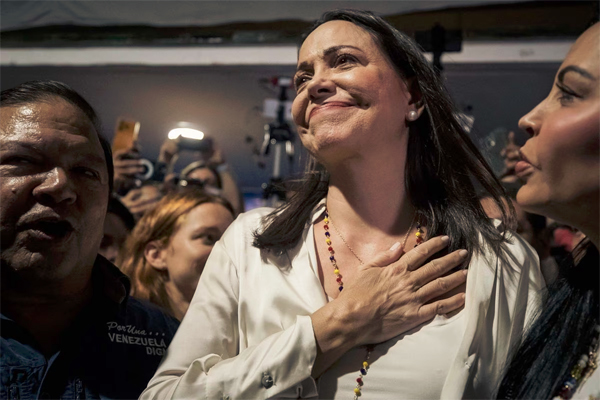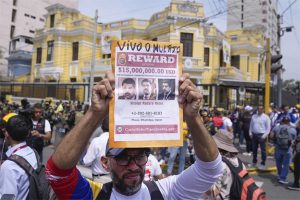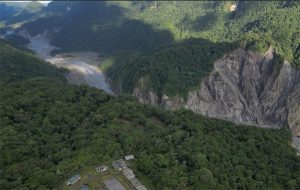
Inés Santaeulalia y Alonso Moleiro, El Pais
BOGOTA/CARACAS
EnergiesNet.com 10 26 2023
Two decades have passed since Maria Corina Machado became known to the whole world. The Venezuelan politician was the scourge of Chavismo, the first to call them a dictatorship, one of the few who told the powerful Hugo Chavez what she thought. It drove him crazy. “You called me a thief”, the Bolivarian leader would scold her out of his mind. Machado was known for being an iron lady, representing the radical wing and defending the toughest confrontation. She dreamed of blowing up Chavismo. Of that politician 20 years younger, there are still some things left, but she is no longer the one hundreds of thousands of Venezuelans have surrendered to. Machado, who this Sunday swept with more than 90% of the votes in the opposition primaries, speaks of defeating Chavismo, but through the ballot boxes and with the help of God instead of the US Army, with the strength of the pain of being a mother separated from her three children, like so many in this Venezuela of young exiles.
This 55 year old industrial engineer had never been able to get along with a country more to the left of her postulates. Her figure was supported among the upper class to which her family has always belonged and among the diaspora, but in the last months she became the closest thing to a princess of the people. The connection of her figure with Venezuelans was not seen coming, but she has suddenly put an end to the hopelessness that for years had been installed in a society more concerned with surviving the day to day economic crisis than with defeating Chavismo. The failed strategies of the opposition during the last years did not take their toll on Machado, who for some time had disassociated herself from almost all her decisions, so it was not difficult for her to renew her name and her message.
Thousands of people have responded to her call from all parts of the country, from the richest to the poorest, even among chavismo’s voting grounds. Also abroad, where 7.7 million Venezuelans have emigrated in recent years. The disenchantment with the Government and with an opposition that had sowed confusion due to so much wandering around, has boosted this woman of clear ideas, who seeks to give a complete turn to the country’s economy, and at the same time connects with the pain of so many broken families with a very powerful message: she is also a mother who misses her children, but who decided to stay in Venezuela to fight to leave a better country for her own and for others’ children.
Chavismo tried to undermine the growth of an uncomfortable figure with the announcement, last June, of her disqualification to hold public office for 15 years, a legal quibble denounced internationally and which relaunched her candidacy inside and outside the country for the primaries, but which now may mean a brake to her electoral aspirations. In the agreements signed last week in Barbados between the Government and the opposition, it was agreed to authorize “all candidates and political parties”, but Chavism has removed that possibility from Machado. She, with much higher popularity ratings than Maduro’s, could seriously endanger the permanence of Chavism in power in case of holding elections with all democratic guarantees.
From the outset, this is her nearest horizon to break the government. Machado defines herself and her party, Vente Venezuela, as “liberal” in political, economic and programmatic terms. Her political vision revolves around a reduction of the State as a provider of public policies, the launching of the possibilities of entrepreneurship and the promotion of the free market for the creation of wealth and generation of employment. Her vision of government has a Manchesterian bias, not very different from what Margaret Thatcher, Ronald Reagan or, in Latin America, Sebastián Piñera might have had. She herself looks in those mirrors. “Margaret Thatcher had the courage to defend her values all her life against all that opposed her,” she tweeted in 2013, perhaps in an allusion to herself, who would still have a decade of mockery by chavismo and the opposition ahead of her before this victory.
Machado, and even more so now that he has gathered under his name such diverse opponents, joins that new political current of profiles that do not want to be ideologically labeled. “If stating that the eradication of poverty is a responsibility of the whole society is a leftist idea, then I am a leftist. If believing in personal freedom, in investment, in productivity is a right-wing issue, then I am right-wing,” she argued in 2012. She has a tolerant and flexible stance on issues such as abortion, -about which she asks to open the debate in the country about its decriminalization in case of rape-, the use of medical marijuana and defends gay marriage. Although she is a woman who presents herself as a believer, she denies that her faith will be reflected in her political action.
The opposition candidate has proposed to privatize the public company Petróleos de Venezuela (PDVSA), a taboo in local politics, and to return to their owners all the companies expropriated by Chavism, among which is Siderúrgica Venezolana, the company of which her father (who died this year) was president of the Executive Committee. Machado wants to deregulate controls, promises to punish corruption and promote a general amnesty for political prisoners, encourage outward growth and resume contact with multilateral organizations.
Influenced by economists such as Ludwig Von Mises or Milton Friedman, he has an interpretation of local politics to the right of the traditional parties of Venezuelan democracy prior to Chavismo. A somewhat more American than European vision on the distribution of social funds to generate welfare and a profoundly anti-communist discourse. Instead of the traditional social-democratic state promoter of the 20th century, Machado proposes the reduction of welfare and the construction of a society without crutches to end the weight of the oil state in the life of the population, where she picks up an idea very present in Venezuelan thinkers such as the novelist Arturo Uslar Pietri and the liberal intellectual Carlos Rangel, to whom she frequently refers.
Her attacks to Chavismo and her enmity with a large part of the opposition turned her into a solitary politician who now has the obligation to unite all those who want a change and who, according to the mobilization in the primaries and the popularity polls, are in the majority. Machado is sure that at her side today there are Chavistas and opponents of all spectrums, surrendered to her figure. Her path towards the presidential elections, in which she must get rid of the disqualification imposed by Chavism if she wants to register her candidacy for 2024, will depend on this popular support, on the not always certain union of all opposition parties and on the pressure exerted by Washington on Caracas.
Translated by Elio Ohep, Editor EnergiesNet
elpais.com 10 24 2023











